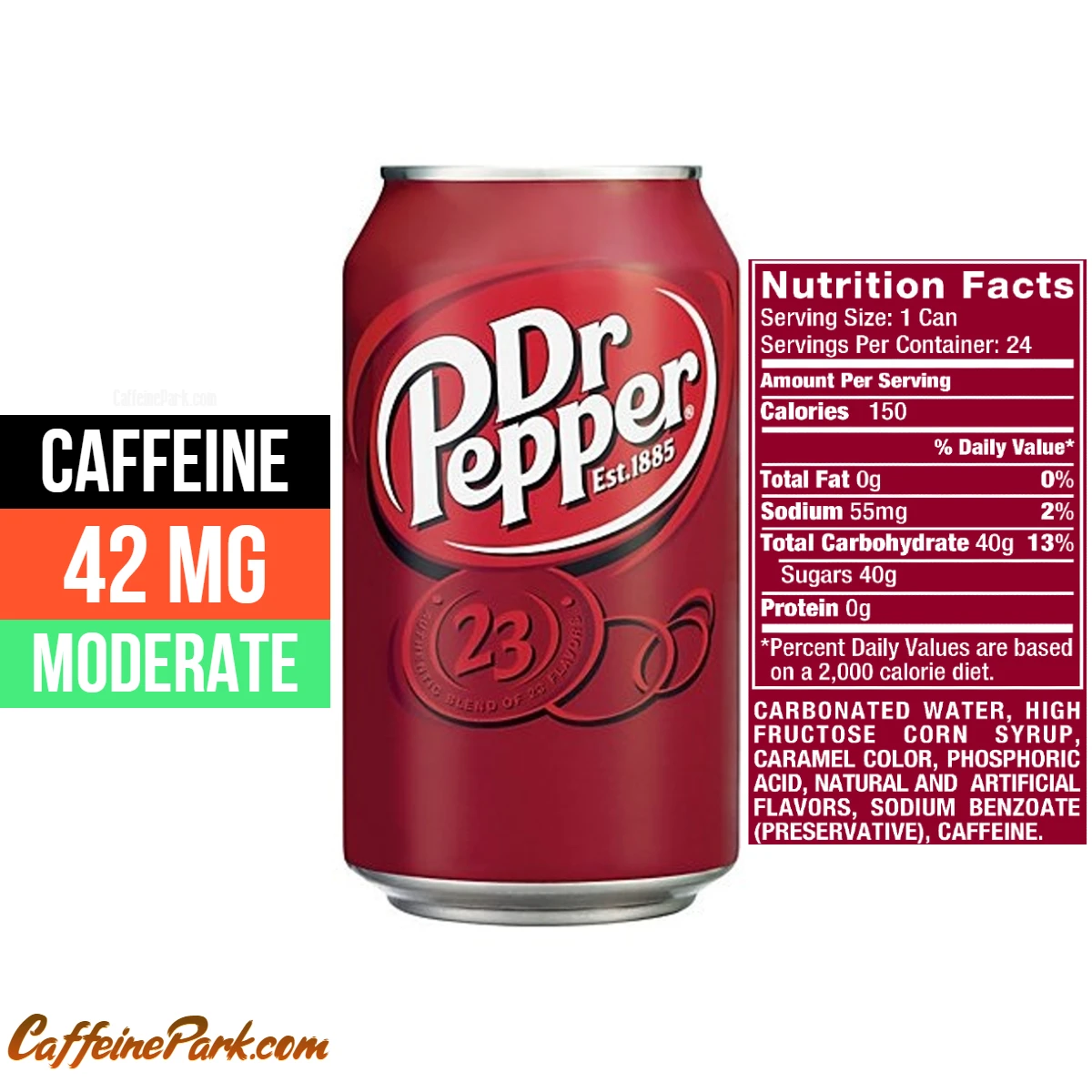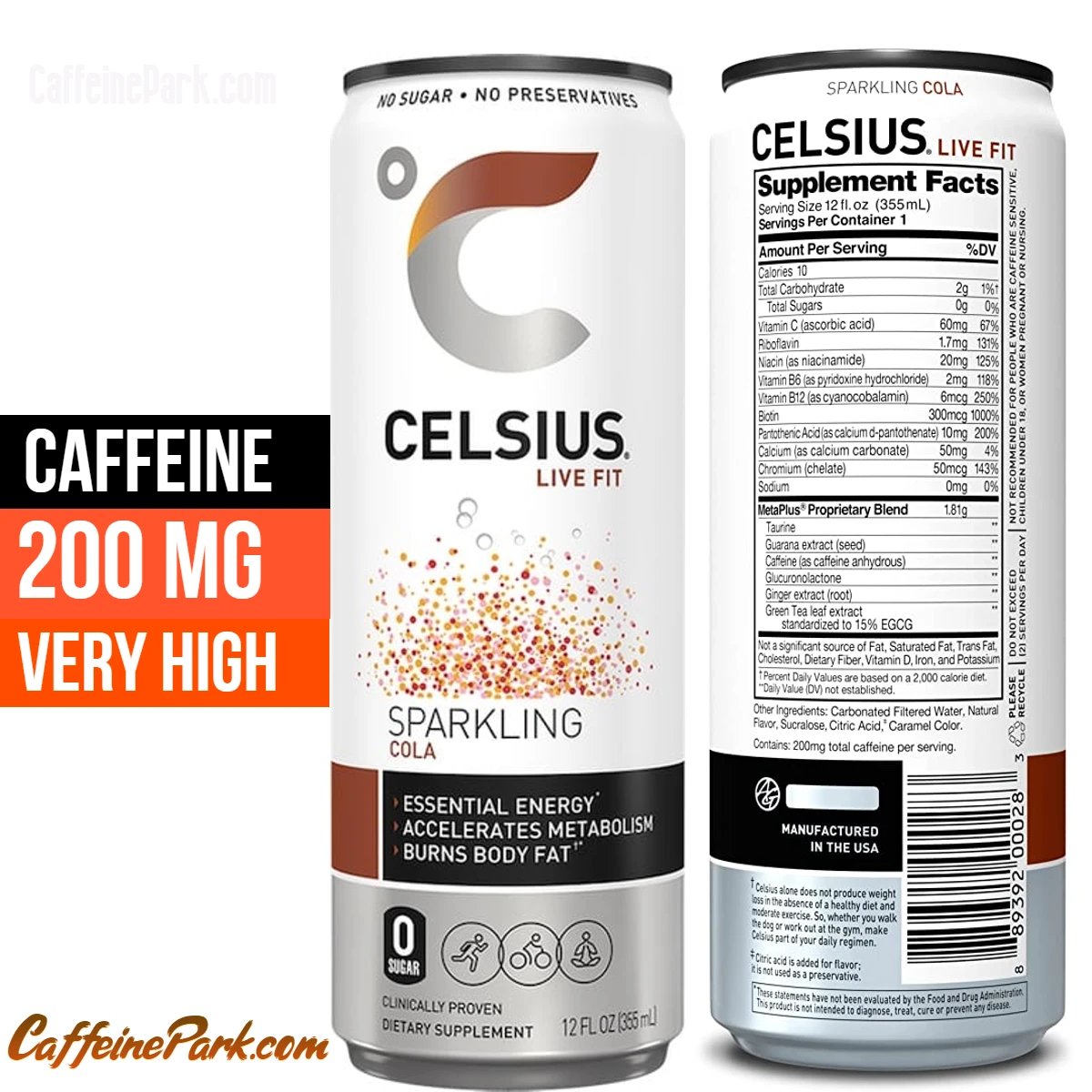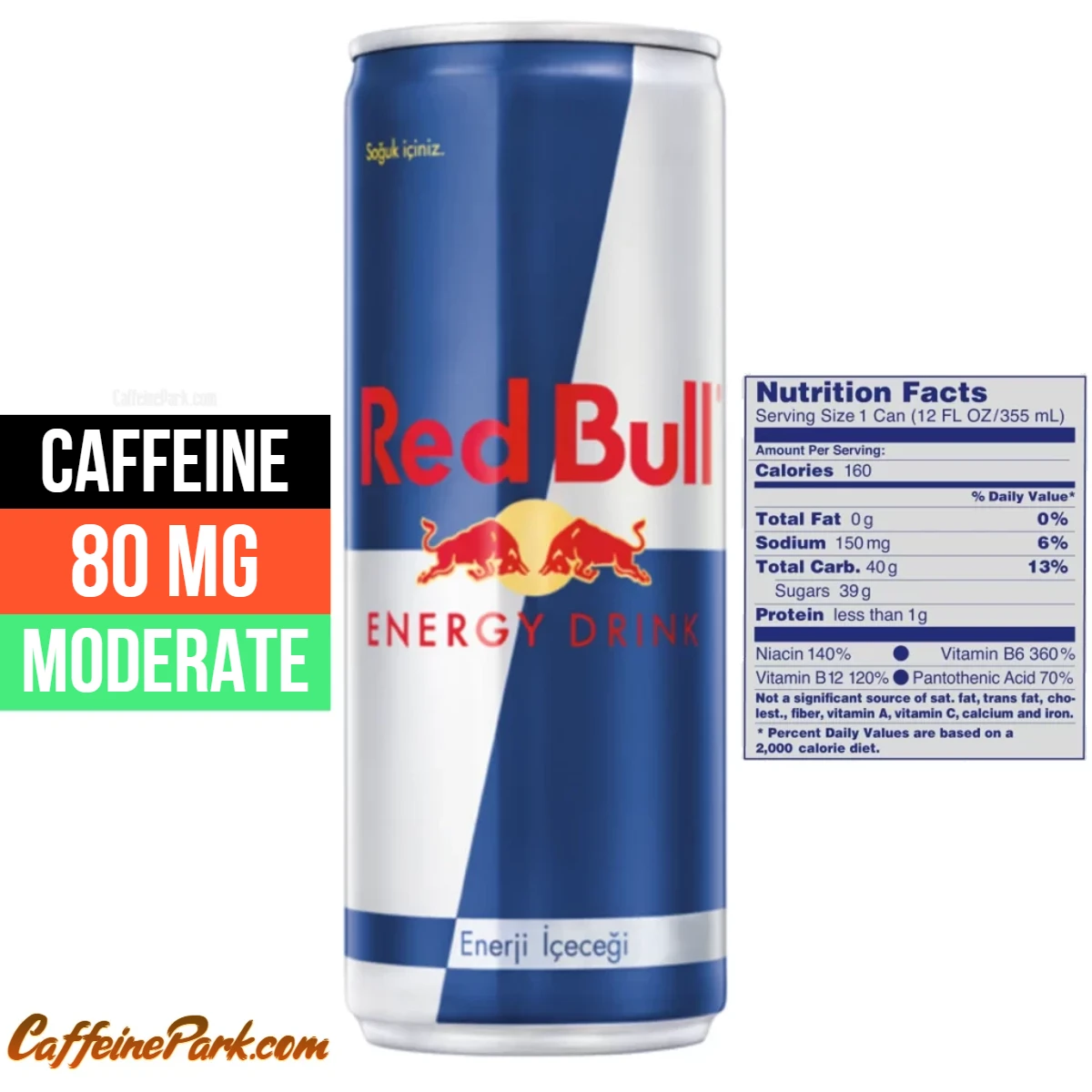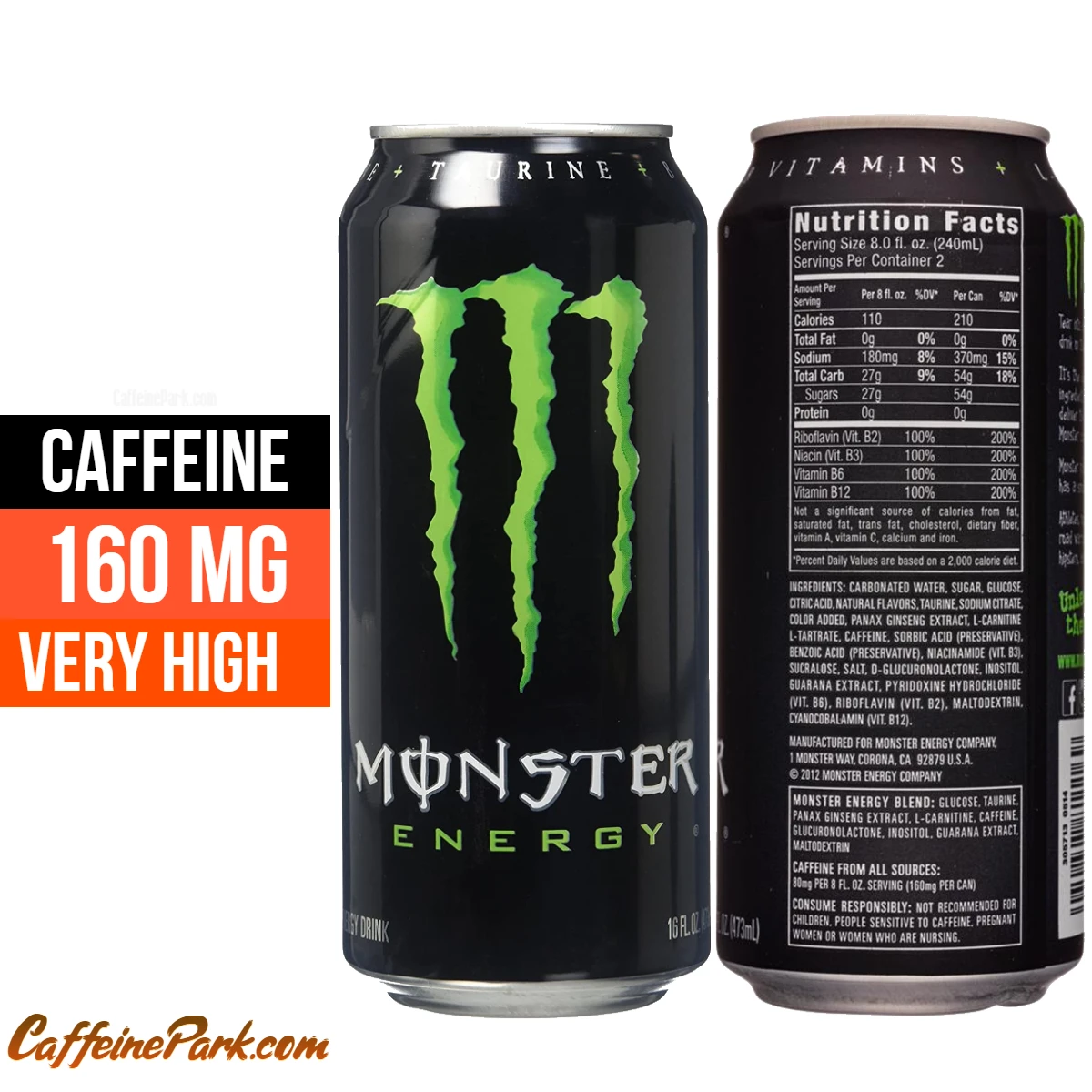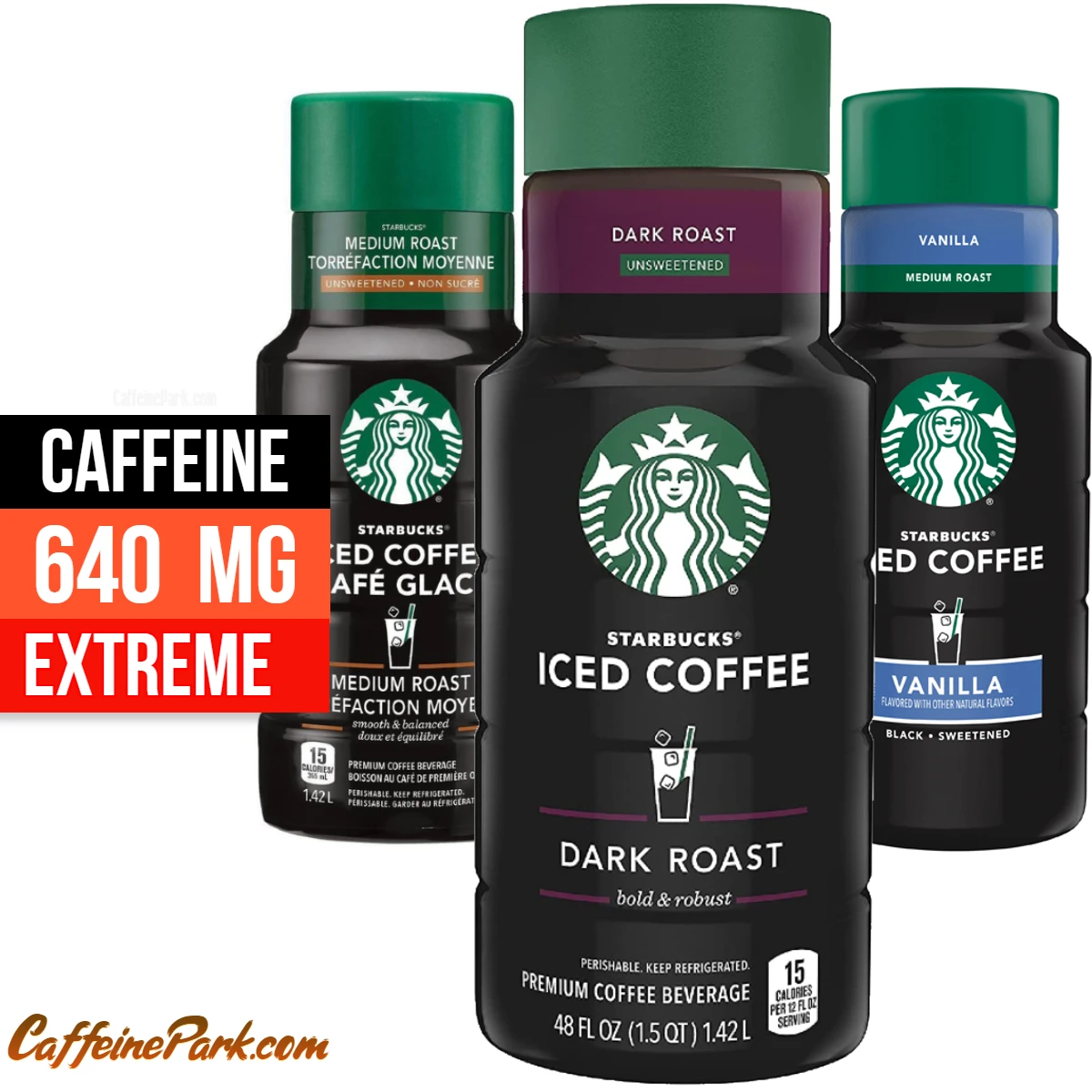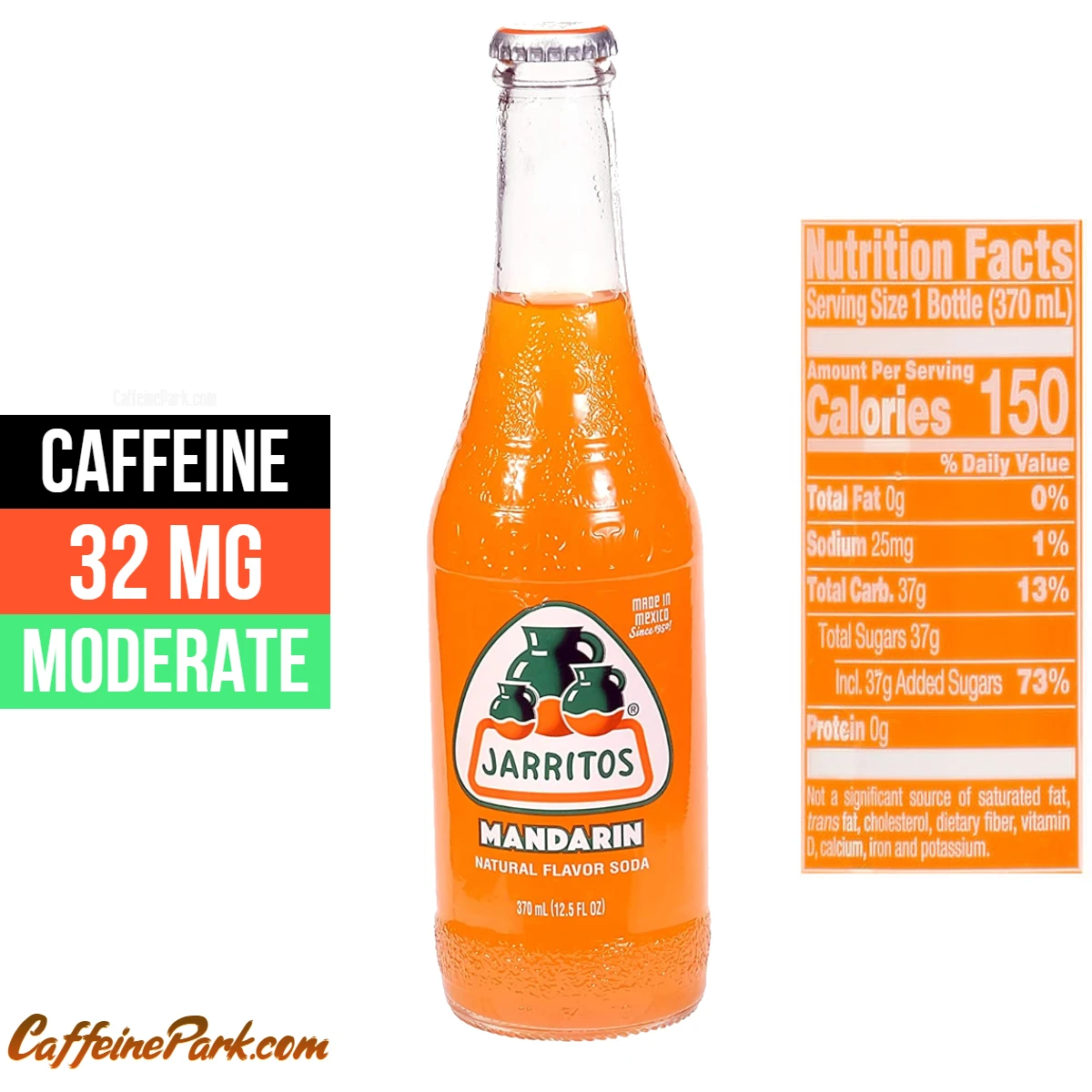Coke (Coca-Cola) Caffeine Content
How Much Caffeine is in Coke (Coca-Cola Classic)?
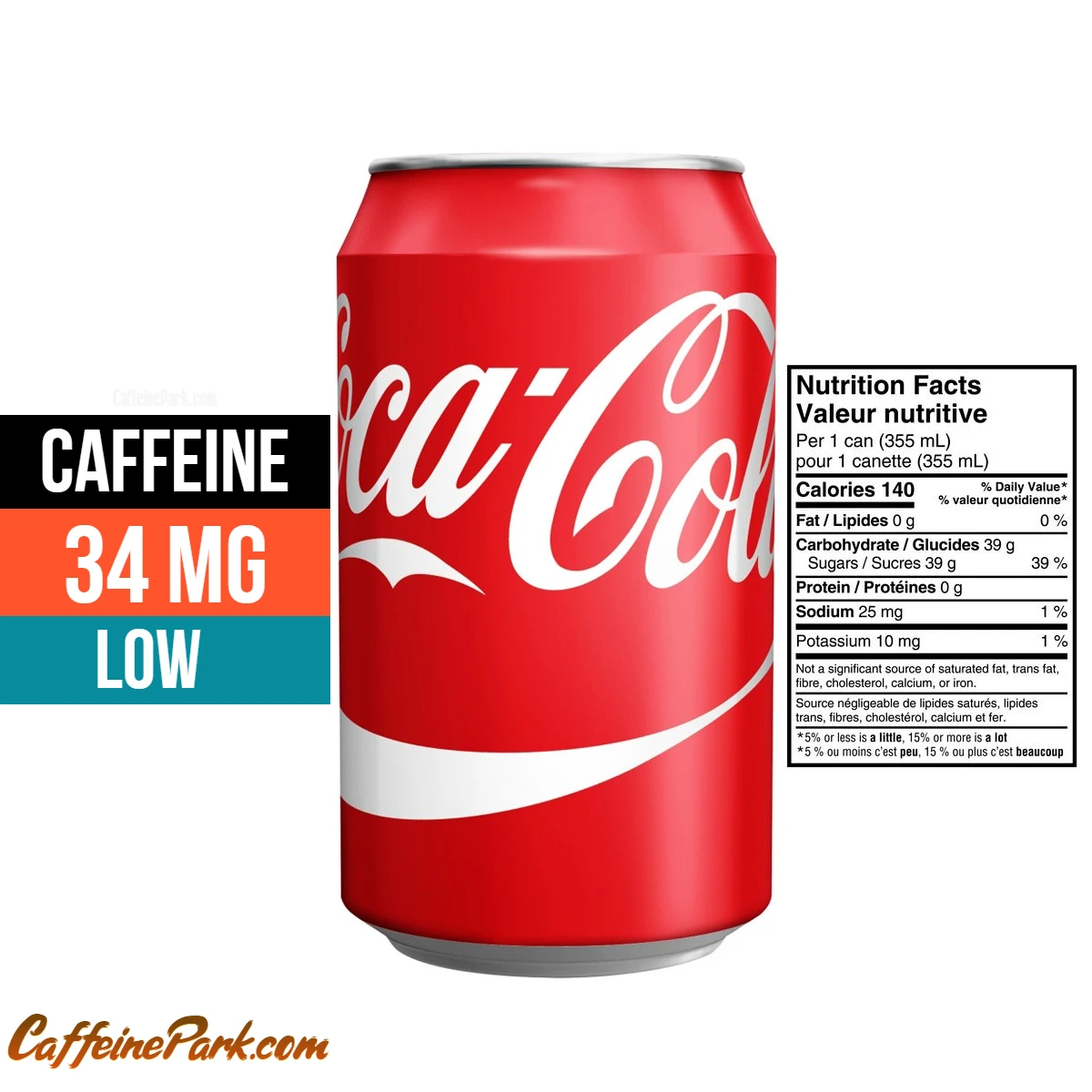
The exact caffeine content of Coca-Cola Classic can vary depending on the country and the size of the serving. On average, a 12 oz (355 mL) serving of Coca-Cola Classic contains about 34 mg of caffeine. This is slightly less than the average caffeine content of a cup of coffee, which is about 95 mg per 8 oz (237 mL) serving.
Coca-Cola Classic is not the only soft drink that contains caffeine. Many other popular soft drinks, such as Pepsi and Mountain Dew, also contain caffeine. Some energy drinks, like Red Bull, contain even more caffeine than Coca-Cola Classic.
Does Coke have Caffeine?
Yes, Coke contains 34mg of caffeine per 12 fl oz can and 2.83mg of caffeine per fl oz (9.58mg per 100ml).
| Serving size | Caffeine Amount | Caffeine strength |
|---|---|---|
| 100ml | 9.7 mg | LOW |
| 8 fl oz | 22.7 mg | LOW |
| 12 fl oz can | 34 mg | LOW |
| 1L | 95.8 mg | HIGH |
- Caffeine Amount: 34 mg
- Caffeine strength: LOW
- Calories: 140
- Serving size: 12 fl oz can
- Sugar: 39 g
Ingredients in Coca-Cola Classic
- Carbonated Water
- High Fructose Corn Syrup
- Caramel Color
- Phosphoric Acid
- Natural Flavors
- Caffeine
Caffeine in Variations of Coca-Cola
Variations of Coca-Cola include New Coke, Diet Coke, Diet Coke, Vanilla Coke, etc. All contain different flavors. They also may or may not contain caffeine.
| Drink | Calories | Caffeine (mg) |
|---|---|---|
| Coca Cola Energy | 140 | 114 |
| Coca Cola With Coffee | 70 | 69 |
| Diet Coke | 0 | 46 |
| Diet Coke with Splenda | 0 | 46 |
| Coca Cola Cherry | 150 | 34 |
| Coca Cola Cherry Vanilla | 140 | 34 |
| Coca Cola Cherry Zero Sugar | 0 | 34 |
| Coca Cola Classic | 140 | 34 |
| Coca Cola Orange Vanilla | 140 | 34 |
| Coca Cola Vanilla | 150 | 34 |
| Coca Cola Vanilla Zero Sugar | 0 | 34 |
| Coca Cola Zero Sugar | 0 | 34 |
| Coca Cola Caffeine Free | 140 | 0 |
Compare Caffeine in Coke Vs. Popular Drinks
Caffeine is a stimulant found in many products. It is used by the human body to increase energy levels. However, caffeine can be addictive if consumed regularly. This is why you shouldn’t consume too much caffeine during the day. There are three common sources of caffeine: Coffees, Cocoa, and Teas.
| Popular Drinks | per 100ml | per 250ml | per 330ml |
|---|---|---|---|
| Coca-Cola | 9.7 mg | 24.3 mg | 32 mg |
| Pepsi | 10.7 mg | 26.8 mg | 35.3 mg |
| Diet Coke | 12.8 mg | 32 mg | 42.2 mg |
| Coke No Sugar | 9.6 mg | 24 mg | 31.7 mg |
| Instant Coffee without Milk | 31 mg | 77.5 mg | 102.3 mg |
Review
Coca-Cola Classic, commonly known as Coke, is a carbonated soft drink produced by The Coca-Cola Company. The brand’s signature product, Coke is often consumed for its caffeine content, which is believed to provide a boost of energy and alertness.
History of brand
Coca-Cola Classic was first created in 1886 by John Pemberton, a pharmacist in Atlanta, Georgia. Pemberton’s original formula was intended as a patent medicine, with the Coca-Cola name meant to suggest that the drink had medicinal properties. The beverage was initially sold at soda fountains, with sales beginning to take off in the 1890s.
In 1892, Asa Griggs Candler, the president of The Coca-Cola Company, purchased the rights to the Coca-Cola formula for $2,300. Candler then oversaw the expansion of the Coca-Cola brand, with Coke becoming available in bottles for the first time in 1899.
Coca-Cola Classic has undergone a number of formula changes over the years. The most significant of these occurred in the 1980s when the company decided to change the flavor of the drink to appeal to a wider audience. The new formula, dubbed “New Coke,” was met with widespread backlash, and the company quickly returned to the original formula, which was rebranded as “Coca-Cola Classic.”
Taste and Flavor
Coca-Cola Classic has a distinct and recognizable taste that has been a cultural icon for over a century. The drink is sweet, with a strong caramel flavor that is balanced out by a hint of citrus. The carbonation gives it a slight fizziness on the tongue, which adds to the overall drinking experience. The taste of Coca-Cola Classic is often described as being “refreshing” and “invigorating”.
The recipe for Coca-Cola Classic is a closely guarded secret, which is said to contain a blend of natural flavors and a unique combination of spices. The exact recipe has not been revealed, but it is known that it contains caramel, vanilla, and a hint of lime. The recipe is said to have remained mostly unchanged since it was first created in 1886 by John Pemberton.
The taste of Coca-Cola Classic is often considered to be a benchmark for other cola-flavored soft drinks. Many people find that the taste of other cola-flavored soft drinks is not as strong or as distinct as the taste of Coca-Cola Classic. The taste of Coca-Cola Classic is often considered to be a perfect balance of sweetness, carbonation, and a hint of citrus.
In summary, the taste and flavor of Coca-Cola Classic are a distinct, sweet, and caramel flavor with a hint of citrus that is balanced out by carbonation, making it refreshing and invigorating. The recipe, a closely guarded secret, is said to have remained mostly unchanged since it was first created in 1886, and it is often considered as a benchmark for other cola-flavored soft drinks.
Benefits
Coca-Cola Classic contains caffeine, which is a stimulant that can help increase alertness and reduce fatigue. This makes it a popular choice for people who need a pick-me-up in the middle of the day or during long work hours. Additionally, Coca-Cola Classic is a good source of carbohydrates and can provide a quick boost of energy.
Side effects
However, excessive caffeine intake can lead to negative side effects such as jitteriness, anxiety, and insomnia. Furthermore, consuming large amounts of Coca-Cola Classic can also lead to weight gain due to the high sugar content. The high sugar and acidity in the soda can also lead to tooth decay.
Ingredients
Coca-Cola Classic is made from a blend of caramel color, high fructose corn syrup, natural flavors, and caffeine. Caramel color is a food coloring made from caramelized sugar, which is used to give Coca-Cola Classic its characteristic dark brown color. High fructose corn syrup is a sweetener made from corn that is used to sweeten Coca-Cola Classic and many other food and beverage products. Natural flavors are ingredients that are derived from natural sources (such as spices, fruit, or vegetables) and are used to add flavor to Coca-Cola Classic. Caffeine is a stimulant that is added to Coca-Cola Classic for its stimulating effects on the central nervous system.
Caffeine content
Coca-Cola Classic contains an estimated 34 milligrams of caffeine per 12-ounce serving, which is slightly less than the caffeine content of a similar serving of coffee. Caffeine is a naturally occurring stimulant that is found in a number of plants, including coffee beans and cocoa beans. It is believed to have a number of effects on the body, including increasing alertness, reducing fatigue, and improving concentration.
Price and Availability
Coca-Cola Classic is widely available in most countries and can be found in supermarkets, convenience stores, and vending machines. The price of the drink can vary depending on the location and the size of the serving, but it is generally considered to be reasonably priced.
Comparison to others
Coca-Cola Classic is one of the most popular and recognizable soft drinks in the world. It is often compared to other cola-flavored soft drinks such as Pepsi and RC Cola. While all three drinks are similar in terms of taste, Coca-Cola Classic is often considered to have a stronger and more distinct flavor than its competitors.
In terms of taste, Coca-Cola Classic is often described as having a more complex and well-balanced flavor than other cola-flavored drinks. The caramel and vanilla notes are more prominent, and the hint of lime gives it a slightly tangy finish. Some people find that the taste of other cola-flavored drinks is too sweet or too artificial in comparison.
In terms of caffeine content, Coca-Cola Classic and Pepsi have similar caffeine content with approximately 34 mg per 12 oz (355 mL) serving. However, RC Cola has less caffeine content than both.
In terms of availability, Coca-Cola Classic is widely available in most countries and can be found in supermarkets, convenience stores, and vending machines. Pepsi is also widely available and can be found in similar locations. RC Cola, on the other hand, may not be as widely available as the other two.
In terms of price, Coca-Cola Classic and Pepsi are generally considered to be reasonably priced, while RC Cola may be slightly cheaper.
In summary, Coca-Cola Classic is often considered to have a stronger and more distinct flavor than other cola-flavored soft drinks such as Pepsi and RC Cola. In terms of caffeine content, all three drinks have a similar content, but the availability and price may vary. Coca-Cola Classic and Pepsi are widely available and reasonably priced, while RC Cola may be less widely available and slightly cheaper.
Customer Reviews
Coca-Cola Classic has a loyal fan base that has grown over the years. Many people appreciate its unique taste and enjoy its caffeine content. However, some people may find the drink too sweet or too carbonated. Additionally, some people may prefer other cola-flavored soft drinks over Coca-Cola Classic.
Pros and Cons
Pros:
- Distinct and recognizable taste
- Contains caffeine which can help increase alertness and reduce fatigue
- Widely available
- Reasonably priced
Cons:
- The high sugar content can lead to weight gain
- High acidity and sugar content can lead to tooth decay
- Some people may find it too sweet or too carbonated
Health Concerns
Some people may have concerns about the ingredients used in Coca-Cola Classic and their potential health effects. High fructose corn syrup has been linked to an increased risk of obesity and other health problems, and caramel color has been found to contain trace amounts of carcinogenic compounds. Caffeine is a stimulant that can cause side effects such as insomnia, nervousness, and restlessness in some people. It is generally recommended to consume caffeine in moderation and to discuss any concerns about caffeine and health with a healthcare professional.
It is important to note that Coca-Cola Classic and other carbonated soft drinks are not a significant source of nutrients and should not be relied upon as a main source of nutrition. It is generally considered to be safe to consume Coca-Cola Classic and other carbonated soft drinks in moderation as part of a balanced diet, but it is always a good idea to be mindful of your overall intake of sugar, caffeine, and other potentially harmful ingredients. If you have any concerns about the potential health effects of Coca-Cola Classic or any other food or beverage product, it is best to discuss them with a healthcare professional.
Some of the potential health concerns associated with Coca-Cola Classic and other carbonated soft drinks include:
- Sugar content: Coca-Cola Classic and other carbonated soft drinks contain high levels of added sugar, which can contribute to an increased risk of obesity, type 2 diabetes, and other health problems.
- Caffeine content: Coca-Cola Classic contains caffeine, a stimulant that can cause side effects such as insomnia, nervousness, and restlessness in some people. Caffeine can also interfere with the absorption of calcium, which is important for healthy bone growth.
- Artificial ingredients: Some people may have concerns about the use of artificial ingredients, such as caramel color and artificial flavors, in Coca-Cola Classic and other carbonated soft drinks. Caramel color has been found to contain trace amounts of carcinogenic compounds, and some artificial flavors may be derived from animal sources or other questionable ingredients.
Other uses
In addition to its use as a beverage, Coca-Cola Classic has a number of other uses. For example, it is sometimes used as a marinade for meat, as the acid in the Coke helps to tenderize the meat. Coca-Cola Classic is also believed to have cleaning properties and can be used to remove stains or rust. Finally, Coca-Cola Classic has been used as a hair dye, with some people using it to give their hair a reddish-brown color.
Controversies surrounding
Coca-Cola Classic has been the subject of a number of controversies over the years. One of the main criticisms of the drink is that it is high in sugar, which can contribute to a number of health problems, including obesity and type 2 diabetes. Another controversy surrounding Coca-Cola Classic is the use of high fructose corn syrup as a sweetener, which has been linked to a number of health issues, including weight gain and an increased risk of heart disease. Finally, there have been concerns about the potential negative effects of caffeine on health, including the potential for addiction and the risk of developing insomnia or other sleep disorders.
FAQs
Coke, or Coca-Cola, contains approximately 34mg of caffeine per 12 fl oz can or around 2.83mg of caffeine per fl oz (9.58mg per 100ml).
Yes, the caffeine content in Coke is considered moderate. It provides a mild boost of energy compared to some other caffeinated beverages.
The caffeine content in Coke is predetermined and cannot be adjusted. However, you can control the amount of Coke you consume to manage your caffeine intake.
Coke can serve as a source of caffeine, providing a mild energy boost. However, it’s important to be mindful of your overall caffeine intake from other sources throughout the day.
Yes, Coke contains a variety of ingredients, including carbonated water, high fructose corn syrup, caramel color, phosphoric acid, natural flavors, and caffeine.
Individuals who are sensitive to caffeine may need to moderate their consumption of Coke or opt for caffeine-free alternatives to avoid any potential side effects.
Coke is generally not recommended for children due to its caffeine content and other ingredients. It’s best to consult with healthcare professionals or follow the recommended guidelines for children’s beverage consumption.
Yes, Coca-Cola offers caffeine-free versions of its beverages, including Coke Zero Sugar, Diet Coke, and caffeine-free Coke. These options are suitable for those who prefer to avoid caffeine.
Coke can be enjoyed as part of a balanced diet when consumed in moderation. It’s important to consider your overall beverage choices and prioritize a varied and nutritious diet.
Is Coke more caffeinated than coffee?
In general, coffee contains more caffeine than Coke. A typical 8-ounce serving of coffee contains 80-100 milligrams of caffeine, while a 12-ounce serving of Coke contains 34 milligrams of caffeine. However, it is important to note that the amount of caffeine in coffee can vary greatly depending on factors such as the type of beans used, the roast level, and the brewing method.
Is Coke caffeine-free?
Yes, Coca-Cola does offer caffeine-free versions of its drinks in some countries. In the United States, caffeine-free Coke is widely available. In other countries, caffeine-free versions of Coke may be more difficult to find.
Is caffeine in Coke harmful to children?
Caffeine is not recommended for children, as it can interfere with normal growth and development. The American Academy of Pediatrics advises that children and adolescents should limit their caffeine intake to no more than 100 milligrams per day. A 12-ounce serving of Coke contains 34 milligrams of caffeine, so it is not recommended for children to consume large amounts of Coke or other caffeinated beverages.
Does Coke contain other ingredients that may be harmful?
Coca-Cola contains a number of ingredients in addition to caffeine, including caramel color, high fructose corn syrup, and natural flavors. Some of these ingredients have been the subject of controversy and debate regarding their potential health effects. For example, high fructose corn syrup has been linked to an increased risk of obesity and other health problems, and caramel color has been found to contain trace amounts of carcinogenic compounds. However, it is important to note that the amounts of these ingredients in Coke are small and are not likely to cause harm when consumed in moderation as part of a balanced diet.
Is Coke high in caffeine?
The amount of caffeine in Coke is considered moderate. A 12-ounce serving of Coke contains 34 milligrams of caffeine. This is slightly less than the amount of caffeine in a cup of coffee, which typically contains 95 milligrams of caffeine per 8-ounce serving. However, the amount of caffeine in Coke can vary depending on the size of the serving and the country in which it is purchased. It is generally recommended to limit caffeine intake to no more than 400 milligrams per day for adults. Pregnant women, nursing mothers, and children should be particularly careful about their caffeine intake.
Does Coca-Cola offer any low or reduced-caffeine options?
Yes, Coca-Cola does offer some low or reduced-caffeine options in certain countries. In the United States, Coke Zero contains a small amount of caffeine (about 1/3 the amount of regular Coke) and is marketed as a diet soda option for those who want the flavor of Coke without the calories or caffeine. In Canada, Coca-Cola Life is a reduced-calorie option that contains about half the amount of caffeine as regular Coke. In other countries, Coca-Cola may offer other low or reduced-caffeine options. It is always a good idea to check the label for caffeine content before consuming any caffeinated beverage.
Does Coca-Cola keep you awake?
Coca-Cola and other caffeinated beverages can have a stimulating effect on the body and may help to increase alertness and reduce fatigue. However, the effect of caffeine on sleep and wakefulness can vary depending on the individual and the circumstances. Some people are more sensitive to caffeine and may experience disrupted sleep or insomnia after consuming it, while others may be less affected.
Caffeine can interfere with the body’s natural sleep-wake cycle by blocking the effects of adenosine, a chemical in the brain that promotes sleep. It is generally recommended to avoid consuming caffeine in the hours before bedtime to ensure a good night’s sleep. If you are sensitive to caffeine or have trouble sleeping, it may be best to limit your caffeine intake or avoid it altogether.
Which Has More Caffeine Coca Cola Coke or Pepsi?
Both Coca-Cola and Pepsi contain caffeine, but the amount of caffeine in each drink can vary depending on the size of the serving and the country in which it is purchased. In general, Coca-Cola contains slightly more caffeine than Pepsi.
In the United States, a 12-ounce serving of Coca-Cola contains 34 milligrams of caffeine, while a similar serving of Pepsi contains 38 milligrams of caffeine. In Canada, a 355-milliliter serving of Coca-Cola contains 30 milligrams of caffeine, while a similar serving of Pepsi contains 36 milligrams of caffeine. In the United Kingdom, a 330-milliliter serving of Coca-Cola contains 9.3 milligrams of caffeine, while a similar serving of Pepsi contains 10.1 milligrams of caffeine.
Is Coca-Cola Classic vegan?
Coca-Cola Classic is not suitable for vegans, as it contains small amounts of ingredients derived from animal sources. These ingredients include natural flavors, which can be derived from a variety of sources including animal by-products such as bone char, which is used to process some types of sugar. Coca-Cola Classic also contains caramel color, which may be produced using animal by-products such as bone char. If you follow a vegan diet and are concerned about animal-derived ingredients in your food and beverages, it is best to check the label or contact the manufacturer for more information.
Is Coca-Cola Classic gluten-free?
Coca-Cola Classic is gluten-free and does not contain any ingredients made from wheat, barley, or rye. However, it is important to note that Coca-Cola Classic is produced in facilities that also process other products that contain gluten, so there may be a risk of cross-contamination. If you have celiac disease or severe gluten intolerance, it is best to check with the manufacturer or consult a healthcare professional before consuming Coca-Cola Classic or any other food or beverage product.
Does Coca-Cola Classic contain any artificial sweeteners?
Coca-Cola Classic does not contain any artificial sweeteners, such as aspartame or saccharin. Instead, it is sweetened with high fructose corn syrup, which is a type of sugar made from corn. Some people may have concerns about the health effects of high fructose corn syrup, as it has been linked to an increased risk of obesity and other health problems. However, it is generally considered to be safe to consume in moderation as part of a balanced diet.
Can Coca-Cola Classic be consumed by people with diabetes?
Coca-Cola Classic and other carbonated soft drinks can be consumed by people with diabetes, but it is important to be mindful of the sugar and calorie content of these beverages. Coca-Cola Classic contains high fructose corn syrup, which is a type of sugar that can affect blood sugar levels. It is generally recommended for people with diabetes to limit their intake of sugar and to monitor their blood sugar levels carefully. If you have diabetes and are considering consuming Coca-Cola Classic or any other carbonated soft drink, it is best to discuss your dietary needs and concerns with a healthcare professional.
Is Coca-Cola Classic suitable for people with food allergies?
Coca-Cola Classic does not contain any ingredients that are commonly associated with food allergies, such as peanuts, tree nuts, milk, or shellfish. However, it is produced in facilities that also process other products that may contain allergens, so there may be a risk of cross-contamination. If you have a food allergy or intolerance, it is always a good idea to check the label carefully and to contact the manufacturer for more information. If you have a severe food allergy, it is best to avoid Coca-Cola Classic or any other food or beverage product that may contain allergens.
Read More:
Contents
- Does Coke have Caffeine?
- Ingredients in Coca-Cola Classic
- Caffeine in Variations of Coca-Cola
- Compare Caffeine in Coke Vs. Popular Drinks
- Review
- FAQs
- Is Coke more caffeinated than coffee?
- Is Coke caffeine-free?
- Is caffeine in Coke harmful to children?
- Does Coke contain other ingredients that may be harmful?
- Is Coke high in caffeine?
- Does Coca-Cola offer any low or reduced-caffeine options?
- Does Coca-Cola keep you awake?
- Which Has More Caffeine Coca Cola Coke or Pepsi?
- Is Coca-Cola Classic vegan?
- Is Coca-Cola Classic gluten-free?
- Does Coca-Cola Classic contain any artificial sweeteners?
- Can Coca-Cola Classic be consumed by people with diabetes?
- Is Coca-Cola Classic suitable for people with food allergies?
